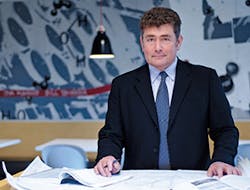Val Frenkel’s lifelong love of water began at age five when his parents enrolled him in swimming school in his native Canada. As an adult, Frenkel rises at 5 a.m. to swim a mile prior to taking on the day’s tasks protecting water resources as vice president of process engineering and managing director for the Pacific coast for Greeley and Hansen.
Frenkel’s experience in working for many of the water sector’s major players has led him to become an industry expert in conventional technologies and all membrane technologies including microfiltration/ultrafiltration, reverse osmosis, seawater reverse osmosis, brackish water reverse osmosis, membrane bioreactors, electrodialysis, electro-deionization, municipal and industrial water and wastewater treatment, industrial water reuse, mining, and oil and gas. He also specializes in technologies relating to desalination, fracking, flowback and produced water, and indirect and direct potable reuse.
Frenkel has worked on more than 300 projects worldwide, many of them being in desalination. He has won a number of awards, including two over the last decade by the International Desalination Association for the Best Technical Paper Presentation. Frenkel also holds six patents on membrane technologies; a method and tool for the preparation of a liquid salt solution, a preparation tool and salt solution for repairing oil wells, a coagulation-microfiltration process for water treatment with a process for purifying water, a microfiltraition membrane called ZeeWeed for ZENON Environmental (currently GE Water), a method and tools to backwash granular media filters, and a method to determine free space in the granular media filters. Frenkel holds a number certifications and leadership positions in numerous water industry associations. He is a visiting lecturer at Stanford University’s civil and environmental engineering program.
As he has worked to perfect membrane technology, Frenkel says he’s awestruck by its flexibility and how much can be accomplished by its proper use. What some people view as challenges, Frenkel regards as opportunities to create innovation. For instance, “fracking—which needed immediate solutions—supported the creation of new technologies and innovations in the water industry and has allowed us to commercialize them,” notes Frenkel.
Frenkel sees commercial opportunities in such areas as osmotic power as a source of renewable energy and views other economic opportunities inherent in the water-energy nexus. He believes that issues relating to the global water crisis can be resolved through available water technologies and water management approaches, but it will take a great deal of political willpower to do so. Frenkel says he likes the private sector for the opportunities it presents. “It’s more dynamic,” he says. “I have several inventions and technologies and have found the private sector is more adaptive to the new stuff, taking more risks and advancing commercialization.”
What He Does Day to Day
Given the two hats he wears, Frenkel’s days are filled with organizing client meetings, working on projects and new technology development, and growing the business.
What Led Him Into This Line of Work
Frenkel was inspired to go into civil engineering through spending time with his father, a professional civil engineer who led a construction company in Europe, as he made his rounds at construction sites. Frenkel earned an M.S. in water and wastewater and a Ph.D. in water and ecology science from Polytechnic University. His thesis explored media (granular) filtration, which Frenkel says continues to be one of the primary separation technologies.
What He Likes Best About His Work
“When I see results—when I see the good that comes out of what I’m doing—that’s what satisfies me,” says Frenkel.
His Biggest Challenge
Working to mitigate the effects of climate change—drought, sea level rise, and increasingly warmer water temperatures—is not only a personal challenge for Frenkel, but he sees it as an industry challenge. His belief is that climate change is attributable less to human influence and more to a natural planetary cycle, such as the one that led to the extinction of dinosaurs, he says. “My opinion is most likely we are at the beginning of one of those cycles,” says Frenkel. He says he also believes that the duration of droughts, storms, and floods will rapidly increase in the coming decade. “The biggest challenge is we are a reactive industry, not proactive,” says Frenkel.

